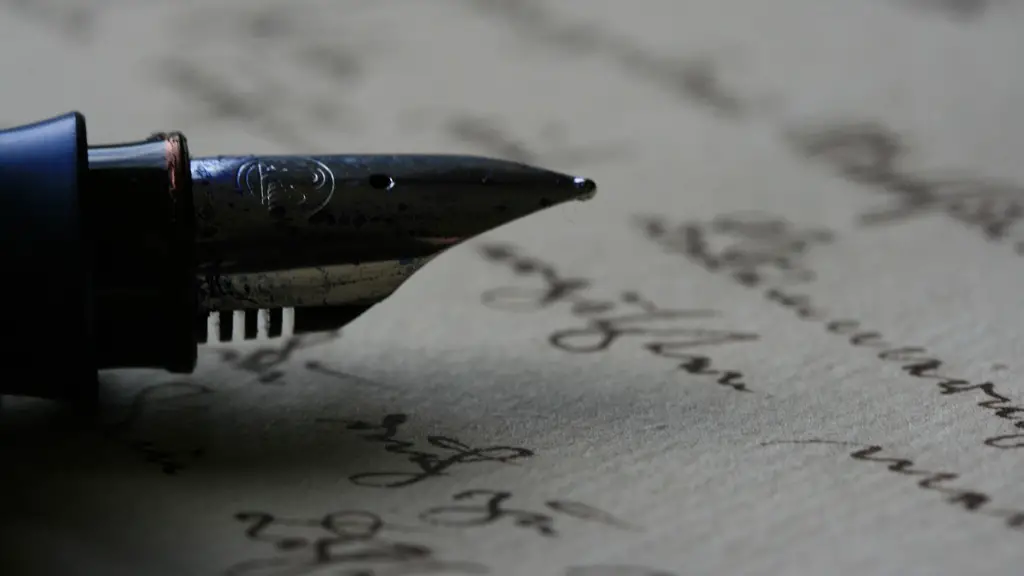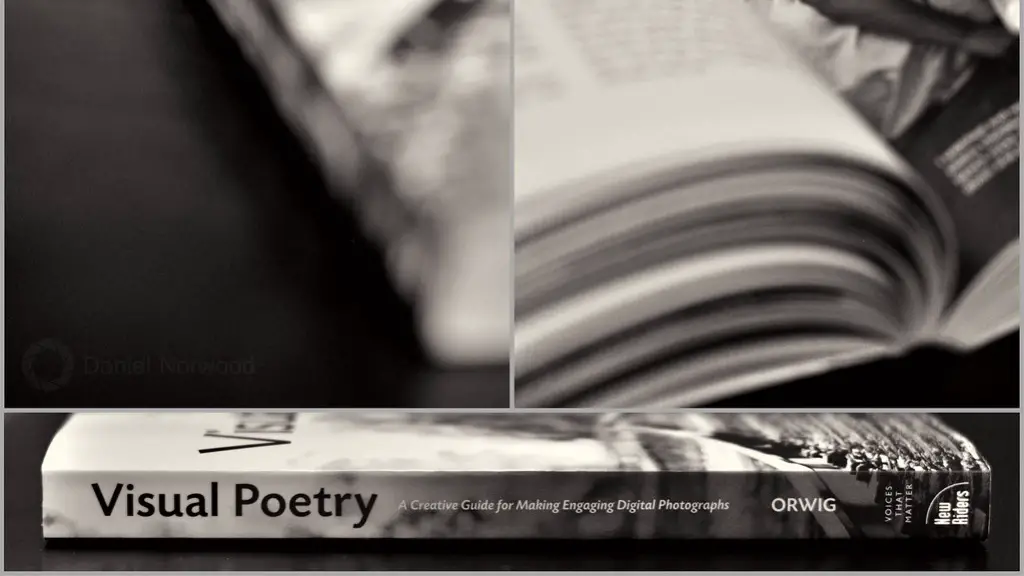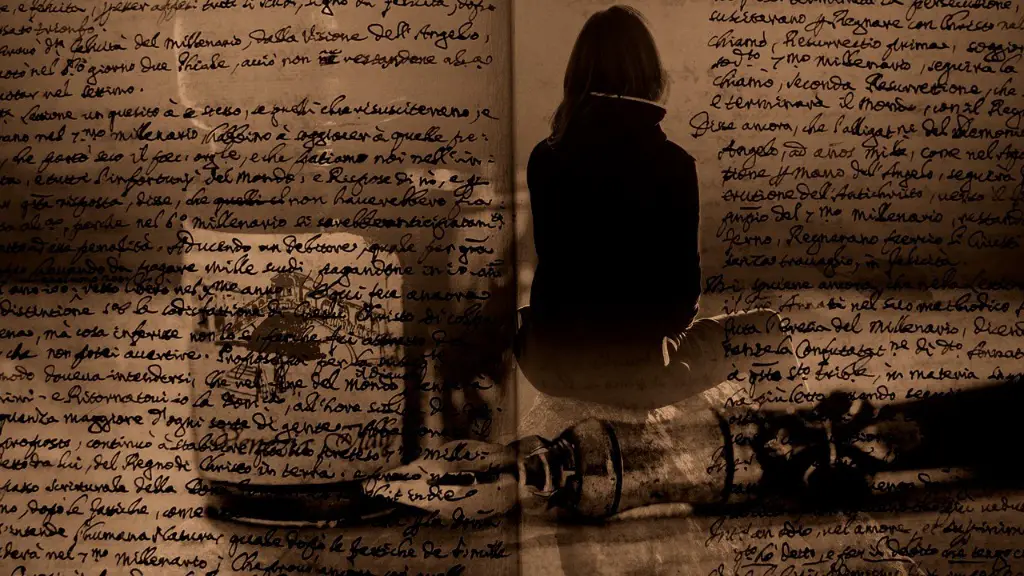What Songs Have Poetry in Them
There is much debate in modern music culture about the overlap between music and poetry. While it is commonly accepted among purists that rap is a subgenre of musical poetry, there is still much debate as to when and how other genres of music can be considered poetic. Songs often contain lyrics, and in some cases, lyrics are defensible as poetry due to their lyrical nature, meter and rhyme schemes. Ultimately, it is the interpretation of the listener that determines what is considered poetic and what is not.
Appreciating poetry with music is not a new idea. Long before rap or hip hop there was what is known as ‘lyric poetry’. This poetic genre usually consists of complex rhyme schemes orchestrated to a musical or choral accompaniment. More recently, songwriters and lyricists have found ways to interweave poetic and musical elements into popular music.
Some might argue that it is difficult to provide a universal definition of what makes a song poetic. Many musicians and songwriters, however, employ poetic devices such as alliteration, assonance, imagery and metaphor, in order to enhance the meaning and lyrical structure of their songs. These devices, if used intelligently and rigidly, allow the listener to interpret their meaning and appreciate them musically.
For example, Leonard Cohen’s song “Hallelujah” requires the listener to pay close attention and interpret the imagery. The lines “Your faith was strong but you needed proof / You saw her bathing on the roof” are layered with meaning, requiring multiple listens to fully appreciate the entire song. Ultimately it is the poetical use of various devices, even simple ones like repetition, that creates a depth of meaning and invites the listener to interpret their own understanding of the song.
The Process of Creating Poetic Songs
Creating a song that is both poetic and musically appealing is an art form in itself. There is so much complexity involved that often the creative process begins with a poetical idea as opposed to a musical one. It is in this way that many artists are able to combine poetic and musical elements to create their unique sound.
This process is often quite a lengthy one. It begins with establishing a title and the core concept, then continues onto the writing of the lyrics and music. During this part of the process, many writers will employ poetic devices such as rhythm, alliteration, assonance and metaphor. The best songs make full use of these devices in order to communicate a universal message that is both intriguing and thought-provoking.
The use of wordplay also plays a big role in modern lyric writing. Wordplay helps to make the song more interesting and sophisticated as well as engage the listener and draw them in. While some songs rely exclusively on wordplay, it is often the combination of poetic and musical elements that makes a song memorable and timeless.
The Place Of Poetry As Music
Undoubtedly, poetry can be used as a medium of expression in music. Many popular hip-hop and rap songs consist of thoughtful lyrics, puns, metaphors and imagery that can be enjoyed even among those who are not particularly musically inclined.
The poetry in these songs, though subtle, is still present. In many cases, it enables the listener to connect with the artist’s story and it helps to enhance the overall message of the song. This is why many artists are beginning to incorporate poetic elements into their songs and it is why many listeners are enjoying music that contains poetic elements.
Furthermore, it is not just rap and hip-hop that use poetry. Artists from other musical genres have also begun to experiment with lyrical poetry due to its emotional appeal and intellectual dynamics. Songs like “Hallelujah” by Leonard Cohen and “The Sound of Silence” by Simon and Garfunkel are both examples of popular songs that contain resonant lyrical poetry.
The Impact of Poetry on Music
It is clear that poetry has had a tremendous impact on the music industry. Many popular songs have intelligently blended poetic elements with musical elements in order to create emotionally powerful and captivating songs.
The influence of poetry on music has made it easier for artists to communicate their message and express their emotions. It has also allowed creators to transcend genres and explore new musical realms.
Many popular songs have gone on to be covered and remixed, providing the audience with an entirely new take on the original. This kind of influence is possible because of the artist’s lyrical creativity and poetic inspiration.
Why Poetry in Music Is Here To Stay
The use of poetry in music is here to stay due to its emotionally captivating and intellectually stimulating nature. It invites the listener to appreciate both the lyrical content and the music itself in a way that no other genre or medium can.
The artist’s ability to capture the essence of their emotion and express it through poetry and music allows them to create timeless and powerful works of art. This is why so many listeners have embraced music that contains lyrical poetry and it is why poetry is an elemental part of modern music culture.
The Benefits of Poetry in Music
The benefits of poetry in music are multifaceted. For the artist, it allows them to push boundaries and use their poetic imaginations to create powerful works of art. For the listener, it invites them to engage in the music and interpret their own meanings from the lyrics.
Perhaps the greatest benefit of poetry in music is its ability to bring people together and promote positive social change. From protest songs to political statements and uplifting affirmations, poetry in music has been used to influence the masses and create meaningful conversation.
The Role of Poetry in Modern Music
Poetry has been an integral element of music since its inception. From ancient lyric poetry to modern hip-hop, many artists have been driven by the need to express their emotions through both music and poetry.
Today, rap and hip-hop are the most prominent musical forms to contain lyrical poetry. These genres have provided artists with an outlet to get their message across and share their experiences with the world.
In the past decade, however, we have seen more and more artists from different genres incorporate lyrical elements into their songs. Pop, rock, folk and even metal all have examples of artists who have used poetry cleverly and creatively to enhance their music.
Exploring Poetry Through Music
Exploring poetry through music can be both an educational and entertaining experience. It encourages the listener to take a deeper look into the meaning of the lyrics and understand their purpose and importance.
It can also allow the listener to form an emotional connection with the music. Poetry adds an intellectual depth and allows the listener to appreciate the nuances and intricacies of the lyrics.
The use of metaphorical and lyrical devices, such as rhymes and alliterations, also helps to give the song more resonance. This is why many artists will use these linguistic tools to ensure the listener interprets their message correctly.
Technological Advances In Music Creation
Technology has played a big part in the creation of poetry-inspired music. With the modern-day computer and its software, it is easier than ever for artists to create and produce their songs.
The ability to record intricately layered tracks and combine poetic elements with musical elements has made it possible for technology to drive artistry. This has allowed certain topics and issues to be explored more deeply and added emotional depth to contemporary music.
From desktop composition software to virtual instruments, technology has enabled artists to push the boundaries of what is possible with music and make their voice heard to the world.
Conclusion
In conclusion, it is clear that music and poetry have been intricately intertwined since their creation. While some might argue that a line exists between music and poetry, the same cannot be said for songs that contain lyrical poetry.
The impact of poetry on music has been immense and its power to evoke emotion and captivate the listener is unparalleled. As technology continues to advance, we can expect to see an increase in lyrically driven songs that contain poetic elements.
Ultimately, it is the listener who will determine what is poetic and what is not, as well as appreciate the blend of music and poetry in any given song.


